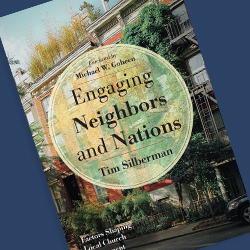30 June 2024

Our churches’ untapped experts
Tim Silberman
My friend James* is constantly speaking to non-Christians about Jesus. He invites them to his house, tells them the gospel, and has seen many young men come to faith. It seems like every time he messages me, he has seen another person become a Christian. But I don’t know many people like James. In fact, as I visit churches in Australia, most people I meet say how hard it is to reach out to their neighbours. They know the gospel is good news, but most people in Australia don’t seem to be interested in hearing it, so they don’t share it.
In our society there are lots of different religious perspectives. Everyone you meet at the sports club, the school gate, or the local café has their own beliefs and doesn’t want to hear about ours. Some are Christian, others Hindu, or Muslim, but most have no religious convictions at all. This combination of diversity and disinterest makes reaching out to our neighbours a challenging exercise. In addition to this, it feels like Christianity is the last faith most people in our community would be drawn to.
Our culture’s celebration of “being true to yourself” puts it at odds with a gospel that describes us as sinners in need of a saviour. Christians’ reluctance to affirm same-sex marriage and gender transition has also led people to equate being a Christian with being opposed to the flourishing of our community. Christians are seen as the problem rather than the solution and, unsurprisingly, the people in our churches are unsure how to engage with their friends and neighbours on spiritual matters.
"What will it take to get people excited about sharing the gospel? What will it take to increase the mission temperature in our churches?"
We live in a complex world full of sceptical people. What is needed to reach them with the gospel? The days of Billy Graham style evangelistic rallies have passed. Many of our gospel outlines don’t resonate with the people we talk to. And we struggle to know how to effectively show and share the gospel. What will it take to get people excited about sharing the gospel? What will it take to increase the mission temperature in our churches? And how do we equip people to reach out to Hindus, Muslims, Buddhists, and secular agnostics who are apathetic about religion?
There are books you can read and courses you can take on developing a culture of mission in your church, but one often overlooked resource that nearly every church has is people like my friend James. James doesn’t attend my church and he doesn’t live in Sydney, or even Australia for that matter. James lives in the Middle East and is serving there as a missionary. The young men he is seeing come to faith are from Muslim families. And he knows more about sharing the gospel in a society opposed to Christianity than almost anyone I know.
Missionaries are experts in mission, and yet our churches rarely benefit from their expertise. Many local churches have relationships with missionaries like James, but the incredible blessing that these friends can be to the church’s involvement in mission locally is often missed. I would like to suggest that there are numerous ways that our local church’s mission engagement would be enhanced if we were to strengthen our relationships with our missionaries.
1. They model the gospel-centred life.
Missionaries are not super-Christians. They are regular followers of Jesus who are convinced that the best way they can serve Christ is by leaving home. This is not something they have done on a whim. For most missionaries there are many years of prayer, planning, and preparation between when they first suspect God may be leading them out, to when they arrive in their context of service. They then must commit to the long process of learning the local language and culture.
Moving into a completely different cultural context is hard. Missionaries often describe feeling like children when they first arrive. Even without the challenge of learning a new language, working out how to do simple things is a challenge. I once spent four hours in a post office in Chennai, India, just trying to send a parcel to Australia! There is nothing inherently praiseworthy about crossing cultures, but people who have rejected our culture’s emphasis on personal comfort and security for the sake of the gospel are worth attention. They provide a beautiful demonstration of prioritising gospel need.
"There is nothing inherently praiseworthy about crossing cultures, but people who have rejected our culture’s emphasis on personal comfort and security for the sake of the gospel are worth attention."
As we hold out the word of truth to our neighbours who question the existence of truth at all, we will be challenged. Sharing the gospel lovingly, graciously and boldly is not easy. If we want to see the people in our churches encouraged to put the gospel before their own personal priorities, then deep relational connections to mission partners who do that every day is a great benefit. Just as the Apostle Paul called the Philippian church to follow the example of single-minded devotion to Christ that he and others displayed (Phil 3:17), we should be highlighting models of devotion to gospel ministry that many of our missionaries provide.
2. They reveal God’s abundant provision for mission
One of the obstacles to missional engagement in our churches is the perception that we don’t have enough resources. The cost-of-living crisis impacts us all in different ways, but when I ask people about their church’s involvement in mission, they often describe to me what sounds like a cost-of-mission crisis. “There are so many good things to do but not enough time, people, or money to do it.” “Our resources are limited.” “We send money to a couple of key mission organisations and try to run programs that people will invite their friends to, but what more can we do?”
Sadly, this view of mission is shaped more by the economic assumptions of our society than it is by Scripture. One of the basic beliefs in a market economy is that resources are valuable because they are scarce. This leads us to be careful about what we commit to. We believe we need to work within our capacity because that is good stewardship. But Jesus himself challenged the anxiety that comes from the belief our resources are limited by reminding us of God’s gracious provision (Matt 6:25-34).
When we pause to look at the world around us we see God’s abundant provision on display. We experience the generosity of God in every aspect of our lives, but most clearly in the Lord Jesus who “became poor, so that [we] through his poverty might become rich.” (2 Cor 8:9). An emphasis on the scarcity of resources inadvertently questions the kindness of God, whereas a focus on God’s abundance towards us will be reflected in our generosity towards others.
"An emphasis on the scarcity of resources inadvertently questions the kindness of God, whereas a focus on God’s abundance towards us will be reflected in our generosity towards others."
Relationships with missionaries are a powerful reminder to us all of God’s abundant provision for his purposes. Hudson Taylor, the founder of the China Inland Mission (now OMF), famously said, “God’s work, done in God’s way, never lacks God’s supply.” This is evidenced day-by-day in the lives of our missionary friends. God provides in all kinds of ways, what is needed for the gospel to go forth.
I’m not suggesting that missionaries never have financial challenges, but their life and ministry provides a tangible picture of God’s abundant provision. As we hear, and then pray, about their needs for a home to live in, people to connect with, opportunities to share the gospel, financial support for specific needs, we see God providing what is needed. This helps us to see God’s eagerness to work through his people to extend the gospel, and it gives us confidence to reach out.
3. They teach us how to connect
The speed at which our culture is shifting is enough to make our heads spin. How can we possibly speak the gospel to people who view the world so differently to us? One of the blessings of living in a culture different to your own is the way it helps you to understand the impact culture has. Effective missionaries are not only gospel experts, they are also culture experts. They understand how to live in a culture different to their own. They have recognised the differences between their new context and their home context. And they have wrestled with the challenge of helping people in their new culture connect with Jesus.
These are the challenges that people in our churches are confronted with when they share the gospel with their neighbours. The context may be different, but the skills that are needed are the same. Part of helping our churches engage with the society around them is teaching them to read the culture and identify key questions, longings and needs that are addressed by the gospel. This is what our missionary friends are regularly wrestling with and there is so much we can learn from them.
4. They highlight the joy of mission involvement.
The final benefit that we can gain from deep connections to our missionary friends is the joy that comes from seeing God at work. When I ask people why we should be involved in evangelism and mission the most common answer I get is, “Because Jesus commanded us to make disciples of all nations” (Matt 28:19). This is true. If Jesus is our Lord, then we cannot let this instruction go unheeded. But I have sometimes seen an emphasis on the command of Christ create a burden on people who see mission as simply a duty to be fulfilled. If we can help people see that mission involvement is a privilege as we join God in the work that he is doing, it becomes a source of joy.
"We then realise that mission involvement is a privilege to be embraced, not a burden to be endured."
Our missionary friends give us front-row seats to the work of God. As we hear their stories, pray for those they are ministering to, and observe the work of the gospel in another context, we will grow in appreciation of God’s global purposes. God is the one who is at work and he graciously invites us to join him. As we share in the work of God in other places through prayer, encouragement and practical engagement it helps us to grow in the appreciation of the fact that it is his work, not ours. We then realise that mission involvement is a privilege to be embraced, not a burden to be endured. God is at work among the nations and in our neighbourhood and he invites us to join in.
Partnership not support
There are many practical strategies that we can use in our churches to deepen the connections between our missionary friends and our churches, but the most important change is in how we think about our relationship with them. At the beginning and end of Paul’s letter to the Philippians, he celebrates the partnership that he has with the church as he takes the gospel to places of great need (Phil 1:5; 4:14-15). The partnership that Paul speaks of is a mutual relationship in which he is blessed by the church and the church is blessed by him.
As we explore the practicalities of working with our missionary friends, we must avoid thinking of it as unidirectional support from us to them, and remind ourselves that it is a partnership. We are working together to see the gospel spread and bear fruit where they are serving and where the church is based. We participate in God’s mission as we encourage, pray, and provide for people like James, and through deep mutual partnership we will also be more able and excited to see the gospel go out at home. If we are truly partners in the gospel, then our gospel outreach will be enhanced among our neighbours and the nations.
Tim Silberman
SMBC Lecturer in Missions
*Not his real name










